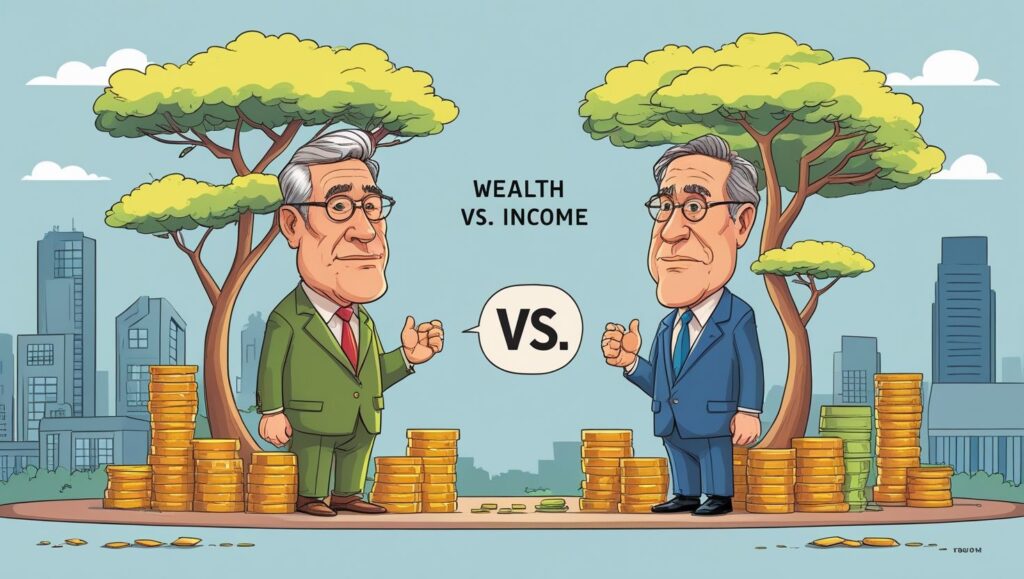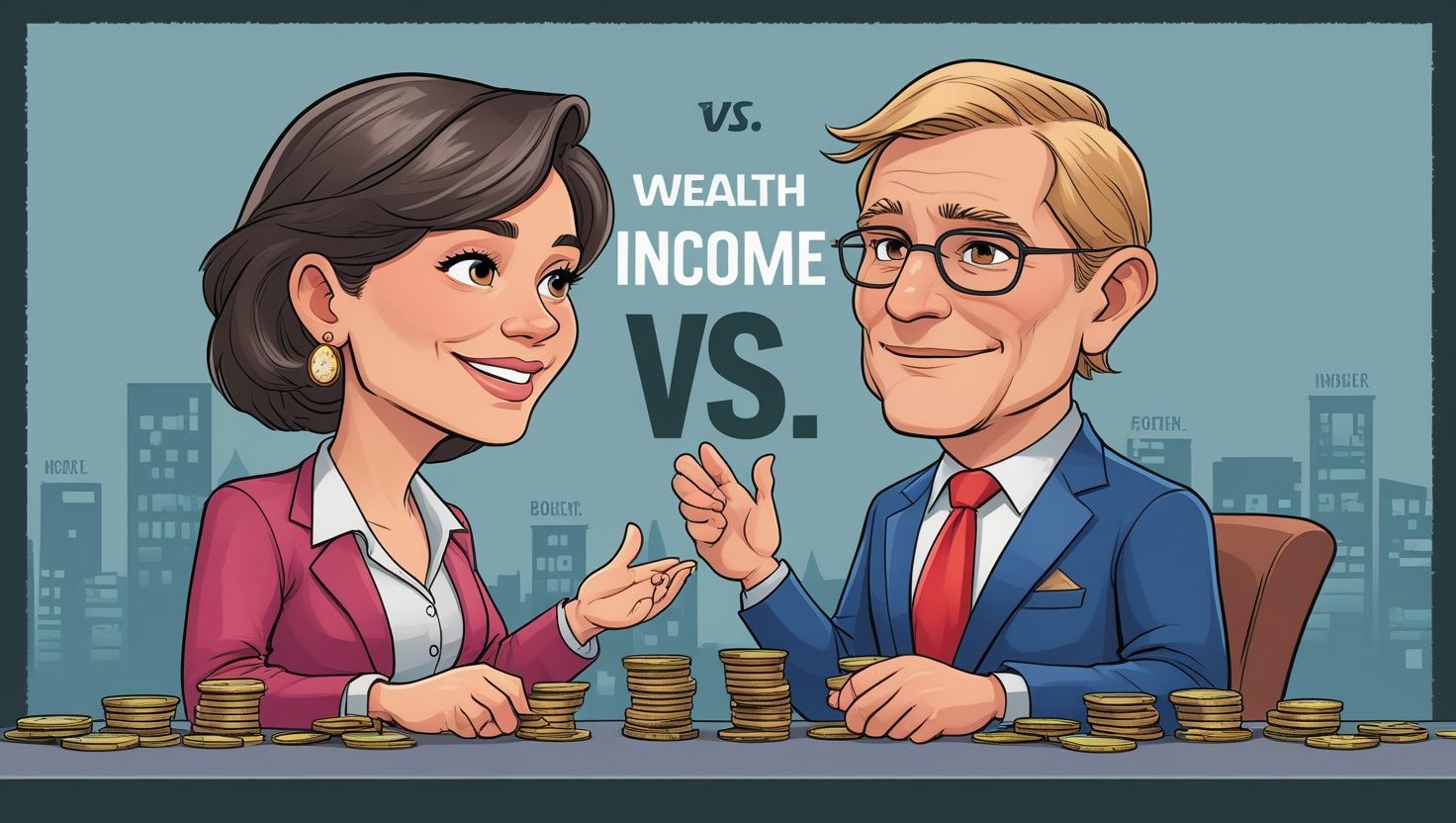Introduction
Wealth vs. Income in the Modern World, In today’s complex financial landscape, the terms wealth and income are often used interchangeably. However, they represent two very different concepts. Wealth refers to the accumulation of valuable assets, such as property, stocks, or savings. Income, on the other hand, is the flow of money earned through wages, salaries, business, or investments. While both play important roles in shaping economic stability, their impact on individuals and societies varies.
In the modern world, the debate about wealth versus income has gained attention due to rising inequality and shifting global economies. Understanding these differences helps people make smarter financial decisions, governments create better policies, and societies address fairness. Therefore, analyzing wealth and income in the present context provides crucial insights into opportunities, challenges, and possible solutions.
Defining Wealth in the Modern Context
Wealth is defined as the total value of an individual’s or household’s accumulated assets, minus debts. Assets may include homes, cars, jewelry, stocks, bonds, savings accounts, and business ownership. Unlike income, which is often temporary, wealth reflects long-term financial security. In the modern world, wealth provides protection against economic shocks such as inflation, job loss, or emergencies. For example, a person with a paid-off home and investments is financially stronger than someone relying only on a monthly salary.
Additionally, wealth creates opportunities for future generations through inheritance and access to better education or healthcare. However, wealth is unevenly distributed across the globe, with a small percentage of people controlling most resources. This imbalance has sparked debates on taxation, redistribution, and social justice. Thus, wealth is more than just money; it symbolizes security, stability, and influence in society.
Defining Income in the Modern Context
Income refers to the money received regularly from employment, business activities, investments, or government support. Unlike wealth, which is accumulated, income is a continuous flow that supports daily living expenses. Salaries, wages, rental income, and dividends are all forms of income. In the modern context, income is essential for meeting immediate needs such as housing, food, education, and healthcare. However, income does not always guarantee long-term financial stability. For instance, a high-income professional may struggle if they lack savings or investments. Moreover, income levels are influenced by education, skills, and access to opportunities, which differ greatly across societies.
As a result, income inequality remains a pressing issue worldwide. While income provides the means for survival, it is wealth that creates lasting economic security. Understanding income in today’s world highlights the importance of balancing present earnings with future financial planning.

The Relationship Between Wealth and Income
Although wealth and income are different, they are closely connected. Higher income often provides the ability to build wealth through savings and investments. For example, a well-paid employee can invest in real estate, which later increases wealth. Conversely, wealth can also generate income. Someone owning multiple properties may earn rental income without working a regular job.
However, not everyone with high income successfully creates wealth, especially if spending outweighs saving. Similarly, some wealthy individuals may not have high incomes but rely on assets for financial support. In the modern economy, this relationship explains why some people remain financially stable even without regular jobs. It also shows why others struggle despite earning good salaries. Therefore, income and wealth should not be seen in isolation. Instead, they function together, shaping an individual’s financial health, stability, and opportunities across their lifetime.
Wealth Inequality in the Modern World
Wealth inequality is one of the most significant challenges in the modern era. A small group of individuals and corporations control a large portion of global assets, while millions live in poverty. This gap between the wealthy and the poor continues to widen. Wealth inequality affects access to education, healthcare, and political influence. In developed countries, the richest often invest heavily in real estate, stocks, and businesses, multiplying their assets. In contrast, low-income families struggle to save due to rising costs of living.
Moreover, wealth inequality creates social tensions, as opportunities for upward mobility decrease. Governments worldwide are debating policies such as wealth taxes, inheritance taxes, and social programs to reduce this imbalance. Although income plays a role, wealth inequality is more concerning because it passes from one generation to another, strengthening cycles of advantage and disadvantage in society.
Income Inequality in the Modern World
Income inequality is another major issue in today’s global economy. The gap between high-income earners and low-income earners continues to expand. While some workers in technology, finance, and medicine enjoy high salaries, many others in labor or service industries earn low wages. This uneven distribution of income limits opportunities for millions. Furthermore, globalization and automation have increased income gaps by reducing the demand for certain jobs. Governments attempt to address this issue by implementing minimum wages, progressive tax systems, and social welfare programs.
However, results vary widely between countries. Income inequality has serious consequences, including reduced consumer spending, social unrest, and political instability. In many societies, income inequality also intersects with gender, race, and regional disparities. While income may fluctuate with job markets, its unequal distribution significantly affects living standards. Therefore, understanding income inequality is crucial for creating fairer, more balanced economies.
Generational Differences in Wealth and Income
Generational differences play an important role in wealth and income distribution. Older generations, such as Baby Boomers, often enjoy higher levels of wealth due to decades of homeownership, pensions, and stable jobs. Younger generations, like Millennials and Gen Z, face challenges such as student debt, high housing prices, and unstable job markets. These obstacles make it harder for them to accumulate wealth, even if they earn decent incomes. Moreover, modern careers are increasingly temporary or freelance-based, reducing long-term financial security.
As a result, wealth gaps between generations are growing. Inheritance also plays a key role, with older generations passing down assets, further widening inequality. Policies on education, housing, and taxation must consider these generational dynamics. Addressing these differences is vital to ensure fairness and opportunity across all age groups in today’s changing financial environment.
The Role of Education in Shaping Income and Wealth
Education is one of the strongest factors influencing income and wealth. Higher education often leads to better-paying jobs, which in turn provide opportunities to save and invest. For instance, professionals with advanced degrees usually have higher incomes compared to those with limited education. However, education also comes with rising costs, creating student debt for many young people. This debt delays wealth accumulation and financial independence. In modern societies, access to quality education is uneven, contributing to income and wealth inequality.
Furthermore, digital skills and lifelong learning have become essential in adapting to changing job markets. Those lacking these skills risk lower incomes and fewer opportunities for wealth creation. Therefore, investing in accessible and affordable education is critical. It not only raises income levels but also helps individuals and societies build sustainable wealth in the long term.
Technology’s Impact on Wealth and Income
Technology has drastically shaped wealth and income in the modern world. On one hand, it has created enormous wealth for entrepreneurs, investors, and corporations in sectors like software, e-commerce, and artificial intelligence. These industries have generated billionaires and transformed global economies. On the other hand, technology has displaced many traditional jobs, reducing incomes for workers in manufacturing and services. Automation, artificial intelligence, and digital platforms have created both opportunities and challenges.
For instance, gig economy jobs provide income but often lack stability, benefits, or opportunities for wealth creation. Additionally, technological access varies across regions, widening the digital divide. Those with advanced skills benefit greatly, while others are left behind. Therefore, technology increases both wealth and income inequality. Governments, businesses, and individuals must adapt to these changes by promoting digital literacy, fair work policies, and inclusive access to opportunities.

Wealth vs. Income: Which Matters More?
The debate over whether wealth or income matters more depends on context. Income is essential for daily survival, as it supports living expenses such as food, housing, and healthcare. However, income alone cannot guarantee financial stability without proper savings and investments. Wealth, on the other hand, ensures long-term security and creates opportunities for future generations. In modern societies, wealth often carries more power because it provides independence and influence beyond regular salaries. For example, a wealthy individual with investments may live comfortably even with little income.
Meanwhile, someone with high income but no savings may face difficulties during unemployment. Ideally, both wealth and income should work together. Income helps sustain daily life, while wealth builds a foundation for stability. Therefore, focusing only on income without creating wealth may leave individuals vulnerable to financial challenges.
Government Policies on Wealth and Income Distribution
Government policies significantly influence the balance between wealth and income. Taxation is one of the main tools used to address inequality. Progressive tax systems, wealth taxes, and inheritance taxes aim to redistribute resources. Social programs such as healthcare, housing, and education also reduce disparities by supporting low-income families. In addition, policies that promote job creation, fair wages, and financial literacy help improve income opportunities. However, challenges remain, as wealthy individuals and corporations often find ways to minimize taxes.
Globalization complicates taxation further, as assets can be moved across borders. While governments strive to create fair systems, political pressures and economic interests frequently affect outcomes. Effective policies must balance encouraging entrepreneurship and investment with ensuring fairness and equality. Therefore, government actions play a central role in shaping how both wealth and income are distributed in modern economies.
The Psychological Impact of Wealth and Income
Wealth and income do not only influence financial well-being but also affect psychological health. High income provides security and reduces stress related to daily expenses. However, if spending habits exceed income, financial anxiety can still occur. Wealth, on the other hand, brings long-term peace of mind. It allows individuals to plan for retirement, emergencies, and family needs. Studies show that people with greater financial security often experience higher life satisfaction and lower stress.
However, wealth and income also shape social status, leading to comparisons and competition. In the modern world, social media highlights luxury lifestyles, sometimes causing dissatisfaction among those with less wealth or income. This psychological impact extends beyond individuals to entire societies, influencing happiness and stability. Therefore, understanding both material and emotional aspects of wealth and income is essential for a balanced approach to financial well-being.
Conclusion
In the modern world, the distinction between wealth and income is more important than ever. Income supports daily life, while wealth ensures long-term stability and opportunity. Together, they shape financial security, social equality, and future possibilities. However, rising inequality in both income and wealth creates serious challenges for individuals and societies. Generational differences, technological changes, and educational disparities all contribute to this imbalance. Government policies, fair opportunities, and personal financial literacy are crucial in addressing these issues.
Ultimately, wealth and income should not be viewed in isolation but as interconnected elements of financial health. Striking the right balance between the two allows individuals to meet present needs while preparing for the future. In an era of rapid change, understanding wealth versus income remains central to building fairer, stronger, and more inclusive societies.
References
- Piketty, T. (2014). Capital in the Twenty-First Century. Harvard University Press.
- Atkinson, A. B. (2015). Inequality: What Can Be Done? Harvard University Press.
- OECD. (2023). Income Inequality and Poverty. Retrieved from: https://www.oecd.org
